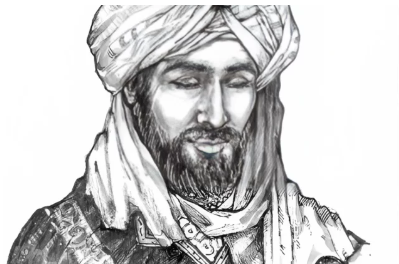
Rediscovering the Oriental poets - Imrou'l Qays

From kingdom to desert
Imrou'l Qays, son of a king of the Kinda tribe, was born into a noble and influential family in northern Arabia. His lineage destined him for a prestigious future, but his life soon took a more tumultuous turn, marked by exile and rebellion. Growing up surrounded by comfort and power, the young prince developed an early passion for poetry, a form of expression particularly prized in pre-Islamic Arab society. Yet it was this passion that, ironically, led to his exile. From his teens onwards, Imrou'l Qays made a name for himself with his love poems, in which he described his romantic adventures and nocturnal escapades without restraint.
However, in a society where modesty and discretion were the norm for royalty, his provocative and sometimes immoral verses shocked the nobles. His father, exasperated by his irresponsible behavior, banned him from court. This banishment, although a personal tragedy for Imrou'l Qays, paradoxically marked the beginning of his legend. From then on, Imrou'l Qays began a nomadic life, traveling the desert and taking refuge with neighboring tribes. However, this rejection did not extinguish his love of poetry. On the contrary, this new freedom enabled him to develop his art further and to immerse himself in the desert landscapes and travel experiences.
Mu'allaqa: The immortal work
The desert became a major source of inspiration in his poems. He describes not only the beauty and harshness of this environment, but also the human emotions reflected in it: love, loss, nostalgia and wandering. His Mu'allaqa, one of the most famous poems in Arabic literature, perfectly illustrates this duality between the exaltation of pleasures and the contemplation of the frivolity of existence. For example, this poem begins with a nasîb, or lyrical introduction, in which the poet laments his past loves and expresses his desire for a woman who is now far away:
“Arise, my companions, let us weep at the memory of the beloved, of a shelter by the dunes she once inhabited.”
Imrou'l Qays does not hesitate to speak frankly about his love affairs, but these verses are not just accounts of conquests: they convey an emotional depth that makes his poems universal. The poet constantly oscillates between the joy of love and the pain of separation, and it is this tension that gives his poetry its strength. The desert landscapes he describes become the mirror of his tormented soul, where the search for love merges with the search for inner peace.
Imrou'l Qays is also renowned for his ability to capture the details of nature with great precision. He evokes sandstorms, shifting dunes, the scarcity of water, but also the fragile beauty of desert roses, symbols of the ephemeral. For Arab readers, this ability to fuse the elements of nature with human emotions made him an unrivaled poet. Another famous passage shows this sensitivity:
“If the morning wind passes through the garden, may the scent of the rose soothe suffering hearts.”
Redemption and legacy
While Imrou'l Qays's poetry is marked by passion, it is also marked by pain and loss. After the death of his father, he embarked on a quest for revenge to reclaim his throne. This quest took him across vast regions of the Arabian Peninsula, where he continued to write and to make contact with the royal courts. His dealings with Byzantine rulers demonstrated his ability to navigate between the Arab and Western worlds. However, Imrou'l Qays died in mysterious circumstances around 540, without having been able to complete his mission of vengeance. It is said that he was poisoned by the Byzantine emperor, Justinian I.
Whatever the case, his work survived well beyond his earthly life, continuing to influence not only Arabic poetry, but the entire Muslim literary tradition. His mu'allaqât were taught and transmitted orally long after his death, becoming a model for the poets who followed him. His influence can be seen in the writings of authors such as Al-Mutanabbi and many other major figures in Arabic poetry. So Imrou'l Qays was not just another poet, but a central figure in the Arab literary tradition. Through his poetry, he captured the beauty and contradictions of human existence. His ability to describe both the greatness of nature and the complexity of human emotions makes him a timeless poet, and we have tried to make a modest rediscovery of him.
Sources :
https://fr.wikipedia.org/wiki/Mu%27allaq%C3%A2t
https://alresala-alarabiya.com/177471/
https://www.persee.fr/doc/jafr_0399-0346_2002_num_72_2_1311
https://fr.wikipedia.org/wiki/Imrou%27l_Qays
https://aftia.fr/imrou-el-qays-grand-poete-arabe/
https://hal.science/hal-01423476/document

